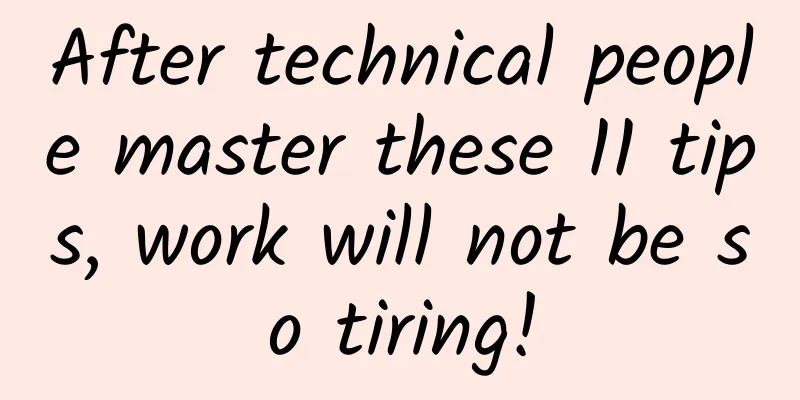After technical people master these 11 tips, work will not be so tiring!

|
It is not uncommon for programmers to lose their enthusiasm for work due to mental and physical exhaustion while programming. There are many articles that can serve as evidence of this, proving that this is already a common phenomenon in the IT industry. Since I have already dealt with burnout myself, I want to explore this issue in more depth to help others solve or even prevent it. Causes of burnout Programmers are more susceptible to burnout than professionals in other fields. I don’t have a clear answer as to why this happens, but I think there are four main reasons.
I've experienced burnout a few times myself. While I never gave up programming, I occasionally doubted whether I had chosen the right career. So, since then, I've started to focus on strategic work methods to maintain long-term motivation and productivity. In this article, I'll introduce some of my development habits, as well as some techniques that can prevent or even eliminate burnout. Let’s start with the basics 1. Eat well. Don't think that being a vegetarian is the end of the world. Try gradually replacing soda with water, eating a low-sugar diet, eating more vegetables, and not overeating. And most importantly, keep going. 2. Sleep well. This includes good sleep quality and adequate sleep time. A better sleeping environment can make us feel refreshed when we wake up. One specific trick is to reduce the exposure to blue light that can keep people awake at night. This can be done by installing Flux to adjust the color of the computer monitor. 3. Don’t overwork. There is already a lot of evidence that productivity, or output, drops dramatically after four hours of focused work. It is impossible for people in highly cognitively intensive jobs like programmers to remain efficient for a long time. 4. Pomodoro Technique. This is a simple and effective method for programmers who want to stay productive while getting some necessary rest. The Pomodoro Technique is to work for 25 minutes, then take a 5-minute break, and then repeat. It works better if you have a specific goal for each work period. Ideally, you should do some activities away from the computer during the break, such as taking a walk, doing push-ups, etc. Of course, you can also take a 30-minute break after three Pomodoro Techniques, which is also very effective. 5. Stay active and keep moving forward. I was going to say exercise, but many people have a misconception that exercise must include going to the gym, or something else. But in reality, staying active can also be achieved by taking the stairs instead of the elevator, or parking your car in a corner and riding a bike to work. In short, other ways to exercise in daily life are easier to achieve, rather than being addicted to the computer all day. More specific points 6. Experiment, play, learn, prototype. These things give you a lot of benefit in the short term and produce output quickly. For example, building websites over and over again in the same way you always do. However, this can become boring and uninteresting over time. Programming is part engineering, using well-proven techniques for producing software. But it also allows you to have fun, experiment, and try new ideas. Spending 20% of your time on technology is one of the most effective strategies to avoid burnout. Technology can mean trying new libraries, creating something fun but not work-related, or learning something you haven't touched before, such as functional programming. 7. Attend meetups, conferences, and listen to podcasts. Programming can be lonely. Meeting other developers or listening to their experiences on podcasts can make you care more about your work. No one likes to complain, but sharing or hearing about other programmers' struggles and how they overcame them can motivate you to keep going. 8. Create a good working environment and don’t skimp on tools. A PC that compiles quickly will save you time waiting unnecessarily. Make sure you have a comfortable chair, desk, and monitor and setup. If you work in a noisy environment, invest in a high-quality headset to isolate the noise. 9. Master the tools. Good tools make programming more enjoyable, and mastering them makes you more productive. This is a well-known point, but I'll say it again. Knowing all the shortcuts in your tools, editors, operating systems, and command lines can save you a lot of time. Automating routine tasks can speed up the process and further keep burnout at bay. 10. Take a break and explore other areas. There are many fun activities besides programming. For example: sports, cultural activities, sex, reading, Lego, social activities, fishing, baking, photography, etc. If you always do one thing continuously, such as programming, then one day you will inevitably be exhausted. So, do some seemingly unrelated work that can actually rekindle your passion, and these works may also inspire you to have new ideas and thoughts, just like the legendary Nobel Prize winner Richard Feynman learned the swing of the board. 11. Consider changing jobs or starting a different project. Burnout can also be caused by the fact that you are always doing boring, exhausting work, such as fine-tuning an existing code base all day. It can also be caused by the fact that the project you are working on no longer meets your interests or your values. In addition, if you find that coding no longer inspires your passion, you can also consider related fields, such as information architecture, system administration, etc., which may rekindle your passion. Integrate those tasks that you can complete smoothly into daily tasks. These tasks include testing code, writing comments, improving variable naming, etc., which can release endorphins and help restore work behavior. This technique is intended to make our brains more motivated for the work we do. in conclusion: There’s no magic bullet to cure burnout, and everyone’s situation is different, so I’ve listed some tips that I’ve found to be effective for you, hopefully. Granted, it takes time to develop new habits, but eating well, sleeping well, exercising, and taking good care of yourself can make you feel better, which in turn can help you do a better job at getting work done and keep your love of programming alive. So, come on. Don't force yourself to work 10 hours a day, 6 days a week. It's scientifically proven that after a certain number of focused working hours, your attention span drops dramatically. So, use the Pomodoro Technique to work efficiently during work hours, and forget about it after get off work. Learn to say no, and do something you enjoy besides programming. This is the really important point, come on, young man! |
>>: Android implements comment and reply functions in social applications
Recommend
Disassembling the three major marketing strategies of Genki Forest
How good is Genki Forest ? There are three pieces...
Android 11 security features and improvements you need to know
[[342213]] 【51CTO.com Quick Translation】Android s...
Xinzhu "30-day hand-painting training camp: Become a hand-painting master even with zero basics"
Xinzhu's "30-Day Hand-Painting Training ...
How should the landing page be designed during the information flow delivery process?
Before I start this article, I want to ask you a ...
20,000 words of pure dry goods丨The inner strength of community operation
This sentence is a line from the movie "The ...
How big is the impact of the US crackdown on WeChat? Tencent: Revenue from the US accounts for less than 2%
Yesterday, Tencent released its unaudited financi...
The basics of game growth cycle design: use a "ruler" to measure
[[150854]] Text/Chen Han Talk about the basis of ...
Four channels for APP to recall users: EDM, Push, SMS, and public account
The author of this article will share with you ho...
Apple launches App Store gift cards. Can it learn from Tencent to open up China’s paid market?
In China, gift cards from various merchants are v...
Drainage methods for medical beauty dental clinics!
Words written in front: A few days ago, in the Q&...
A comprehensive review of the top ten most classic interactive marketing cases!
Today, I will take you to review the top ten inte...
How to do competitive product analysis? 4 directions + 13 key points to tell you how to analyze competitive products!
How to make a practical competitive product analy...
Detailed explanation of the five major channels including Baidu, Toutiao, and Guangdiantong
Your familiarity with channels means whether you ...
How to design a B-side button? Check out this expert summary!
In the B-side interface, buttons are the most bas...
Apple releases medical research platform RearchKit, open source!
[[128956]] On March 10, Apple announced the relea...









